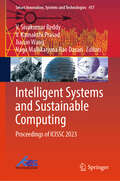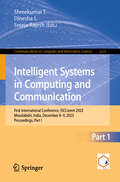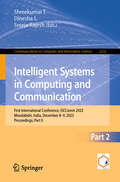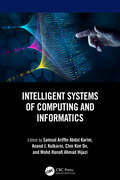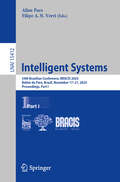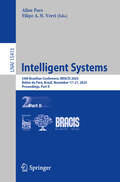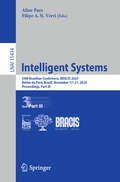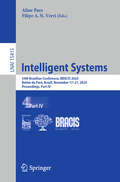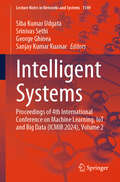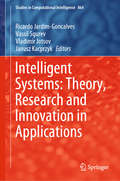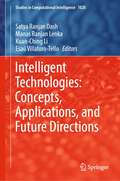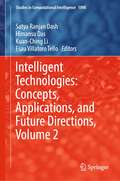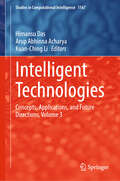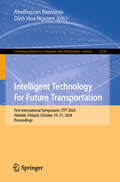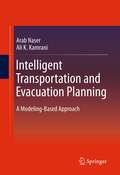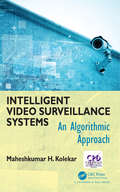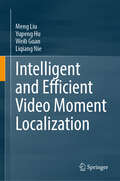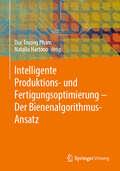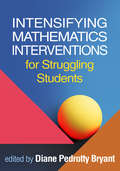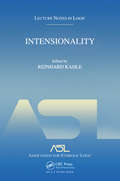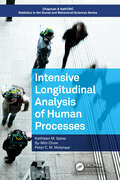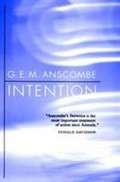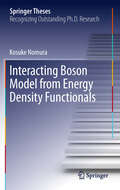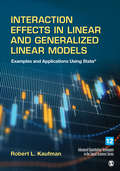- Table View
- List View
Intelligent Systems and Sustainable Computing: Proceedings of ICISSC 2023 (Smart Innovation, Systems and Technologies #417)
by V. Kamakshi Prasad Jiacun Wang V. Sivakumar Reddy Naga Mallikarjuna Rao DasariThis book is a collection of best-selected research papers presented at Third International Conference on Intelligent Systems and Sustainable Computing (ICISSC 2023), held in School of Engineering, Malla Reddy University, Hyderabad, India, during December 22–23, 2023. The book covers recent research in intelligent systems, intelligent business systems, soft computing, swarm intelligence, artificial intelligence and neural networks, data mining and data warehousing, cloud computing, distributed computing, big data analytics, Internet of Things (IoT), machine learning, speech processing, sustainable high-performance systems, VLSI and embedded systems, image and video processing, and signal processing and communication. Chapters 7 and 32 in this book is available open access under a CC BY 4.0 license at link.springer.com.
Intelligent Systems in Computing and Communication: First International Conference, ISCComm 2023, Moodabidri, India, December 8–9, 2023, Proceedings, Part I (Communications in Computer and Information Science #2231)
by Shreekumar T. Dinesha L. Sreeja RajeshThis book constitutes the refereed proceedings of the First International Conference, Intelligent Systems in Computing and Communication, ISCComm 2023, held in Moodabidri, India, during December 8–9, 2023. The 36 full papers and 17 short papers were carefully reviewed and selected from 245 proceedings. They were categorized under the topical sections as follows: Part I: Artificial Intelligence and Machine Learning Part II: IoT&Blockchain Technology, Communication Technology and Data Processing, Image/Video Analysis and Processing
Intelligent Systems in Computing and Communication: First International Conference, ISCComm 2023, Moodabidri, India, December 8–9, 2023, Proceedings, Part-II (Communications in Computer and Information Science #2232)
by Shreekumar T. Dinesha L. Sreeja RajeshThis book constitutes the refereed proceedings of the First International Conference, Intelligent Systems in Computing and Communication, ISCComm 2023, held in Moodabidri, India, during December 8–9, 2023. The 36 full papers and 17 short papers were carefully reviewed and selected from 245 proceedings. They were categorized under the topical sections as follows: Part I: Artificial Intelligence and Machine Learning Part II: IoT&Blockchain Technology, Communication Technology and Data Processing, Image/Video Analysis and Processing
Intelligent Systems of Computing and Informatics
by Anand J. Kulkarni Chin Kim On Abdul Karim, Samsul Ariffin Hijazi, Mohd Hanafi AhmadSince 2011, the Fourth Industrial Revolution (IR4.0) has played a significant role in education, research, and industry. Data technologies have also evolved rapidly to cater to the rapidly growing size of the data as well as to enhance the security of the shared data through multiple resources and platforms.Intelligent Systems of Computing and Informatics aims to develop a new Intelligent Systems of Computing and Informatics (ISCI) to cater to the needs of industries in line with the United Nations’ Sustainable Development Goals (SDGs) of affordable and clean energy and sustainable cities and communities.Comprising 20 chapters by experts from all over the world, this book covers such topics as data technologies, machine learning, signal and image processing, software systems efficiency, computer networking, Internet of Things, and computational intelligence for real-life problems.Key Features: Develops a new system for computing and informatics Provides the state of the art of current research and studies in intelligence systems Written by experts in the field of computing and informatics This book is aimed at postgraduate students, researchers working in various research and development (R&D) agencies, and practitioners, as well as scientists that have an interest in ISCI.
Intelligent Systems: 34th Brazilian Conference, BRACIS 2024, Belém do Pará, Brazil, November 17–21, 2024, Proceedings, Part I (Lecture Notes in Computer Science #15412)
by Aline Paes Filipe A. N. VerriThe four-volume set LNAI 15412-15415 constitutes the refereed proceedings of the 34th Brazilian Conference on Intelligent Systems, BRACIS 2024, held in Belém do Pará, Brazil, during November 18–21, 2024. The 116 full papers presented here were carefully reviewed and selected from 285 submissions. They were organized in three key tracks: 70 articles in the main track, showcasing cutting-edge AI methods and solid results; 10 articles in the AI for Social Good track, featuring innovative applications of AI for societal benefit using established methodologies; and 36 articles in other AI applications, presenting novel applications using established AI methods, naturally considering the ethical aspects of the application.
Intelligent Systems: 34th Brazilian Conference, BRACIS 2024, Belém do Pará, Brazil, November 17–21, 2024, Proceedings, Part II (Lecture Notes in Computer Science #15413)
by Aline Paes Filipe A. N. VerriThe four-volume set LNAI 15412-15415 constitutes the refereed proceedings of the 34th Brazilian Conference on Intelligent Systems, BRACIS 2024, held in Belém do Pará, Brazil, during November 17–21, 2024. The 116 full papers presented here were carefully reviewed and selected from 285 submissions. They were organized in three key tracks: 70 articles in the main track, showcasing cutting-edge AI methods and solid results; 10 articles in the AI for Social Good track, featuring innovative applications of AI for societal benefit using established methodologies; and 36 articles in other AI applications, presenting novel applications using established AI methods, naturally considering the ethical aspects of the application.
Intelligent Systems: 34th Brazilian Conference, BRACIS 2024, Belém do Pará, Brazil, November 17–21, 2024, Proceedings, Part III (Lecture Notes in Computer Science #15414)
by Aline Paes Filipe A. N. VerriThe four-volume set LNAI 15412-15415 constitutes the refereed proceedings of the 34th Brazilian Conference on Intelligent Systems, BRACIS 2024, held in Belém do Pará, Brazil, during November 17–21, 2024. The 116 full papers presented here were carefully reviewed and selected from 285 submissions. They were organized in three key tracks: 70 articles in the main track, showcasing cutting-edge AI methods and solid results; 10 articles in the AI for Social Good track, featuring innovative applications of AI for societal benefit using established methodologies; and 36 articles in other AI applications, presenting novel applications using established AI methods, naturally considering the ethical aspects of the application.
Intelligent Systems: 34th Brazilian Conference, BRACIS 2024, Belém do Pará, Brazil, November 17–21, 2024, Proceedings, Part IV (Lecture Notes in Computer Science #15415)
by Aline Paes Filipe A. N. VerriThe four-volume set LNAI 15412-15415 constitutes the refereed proceedings of the 34th Brazilian Conference on Intelligent Systems, BRACIS 2024, held in Belém do Pará, Brazil, during November 17–21, 2024. The 116 full papers presented here were carefully reviewed and selected from 285 submissions. They were organized in three key tracks: 70 articles in the main track, showcasing cutting-edge AI methods and solid results; 10 articles in the AI for Social Good track, featuring innovative applications of AI for societal benefit using established methodologies; and 36 articles in other AI applications, presenting novel applications using established AI methods, naturally considering the ethical aspects of the application.
Intelligent Systems: Proceedings of 4th International Conference on Machine Learning, IoT and Big Data (ICMIB 2024), Volume 2 (Lecture Notes in Networks and Systems #1149)
by George Ghinea Siba Kumar Udgata Sanjay Kumar Kuanar Srinivas SethiThis book features best selected research papers presented at the Fourth International Conference on Machine Learning, Internet of Things and Big Data (ICMIB 2024) held at GIET University, Gunupur, India, during 8–10 April 2024. It comprises high-quality research work by academicians and industrial experts in the field of machine learning, mobile computing, natural language processing, fuzzy computing, green computing, human–computer interaction, information retrieval, intelligent control, data mining and knowledge discovery, evolutionary computing, IoT and applications in smart environments, smart health, smart city, wireless networks, big data, cloud computing, business intelligence, Internet security, pattern recognition, predictive analytics applications in health care, sensor networks and social sensing, and statistical analysis of search techniques.
Intelligent Systems: Theory, Research and Innovation in Applications (Studies in Computational Intelligence #864)
by Janusz Kacprzyk Vassil Sgurev Vladimir Jotsov Ricardo Jardim-GoncalvesFrom artificial neural net / game theory / semantic applications, to modeling tools, smart manufacturing systems, and data science research – this book offers a broad overview of modern intelligent methods and applications of machine learning, evolutionary computation, Industry 4.0 technologies, and autonomous agents leading to the Internet of Things and potentially a new technological revolution. Though chiefly intended for IT professionals, it will also help a broad range of users of future emerging technologies adapt to the new smart / intelligent wave. In separate chapters, the book highlights fourteen successful examples of recent advances in the rapidly evolving area of intelligent systems. Covering major European projects paving the way to a serious smart / intelligent collaboration, the chapters explore e.g. cyber-security issues, 3D digitization, aerial robots, and SMEs that have introduced cyber-physical production systems. Taken together, they offer unique insights into contemporary artificial intelligence and its potential for innovation.
Intelligent Technologies: Concepts, Applications, and Future Directions (Studies in Computational Intelligence #1028)
by Kuan-Ching Li Satya Ranjan Dash Manas Ranjan Lenka Esaú Villatoro-TelloThis book discusses automated computing systems which are mostly powered by intelligent technologies like artificial intelligence, machine learning, image recognition, speech processing, cloud computing, etc., to perform complex automated tasks which are not possible by traditional computing systems. The chapters are extended version of research works presented at first Ph.D. Research Symposium in various advanced technologies used in the field of computer science. This book provides an opportunity for the researchers to get ideas regarding the ongoing works that help them in formulating problems of their interest. The academicians can also be benefited to know about the current research trends that smooth the way to guide their students to carry out research work in the proper direction. The industry people will be also facilitated to know about the current advances in research work and materialize the research work into industrial applications.
Intelligent Technologies: Concepts, Applications, and Future Directions, Volume 2 (Studies in Computational Intelligence #1098)
by Kuan-Ching Li Himansu Das Satya Ranjan Dash Esau Villatoro TelloThis book discusses automated computing systems which are mostly powered by intelligent technologies like artificial intelligence, machine learning, image recognition, speech processing, cloud computing, etc., to perform complex automated tasks which are not possible by traditional computing systems. The chapters are extended version of research works presented at second PhD Research Symposium in various advanced technologies used in the field of computer science. This book provides an opportunity for the researchers to get ideas regarding the ongoing works that help them in formulating problems of their interest. The academicians can also be benefited to know about the current research trends that smooth the way to guide their students to carry out research work in the proper direction. The industry people will be also facilitated to know about the current advances in research work and materialize the research work into industrial applications.
Intelligent Technologies: Concepts, Applications, and Future Directions, Volume 3 (Studies in Computational Intelligence #1167)
by Kuan-Ching Li Himansu Das Arup Abhinna AcharyaThis book discusses automated computing systems which are mostly powered by intelligent technologies like artificial intelligence, machine learning, image recognition, speech processing, cloud computing, etc., to perform complex automated tasks which are not possible by traditional computing systems. The chapters are extended version of research works presented at third PhD Research Symposium in various advanced technologies used in the field of computer science. This book provides an opportunity for the researchers to get ideas regarding the ongoing works that help them in formulating problems of their interest. The academicians can also be benefited to know about the current research trends that smooth the way to guide their students to carry out research work in the proper direction. The industry people will be also facilitated to know about the current advances in research work and materialize the research work into industrial applications.
Intelligent Technology for Future Transportation: First International Symposium, ITFT 2024, Helsinki, Finland, October 19–21, 2024, Proceedings (Communications in Computer and Information Science #2378)
by Abolhassan Razminia Dinh Hoa NguyenThis book constitutes the refereed proceedings of the First International Symposium on Intelligent Technology for Future Transportation, ITFT 2024, held in Helsinki, Finland, during October 19–21, 2024. The 32 full papers presented in this volume were carefully reviewed and selected from 74 submissions. They are organized according to the following topics: Intelligent Vehicle Technology and Applications; Intelligent Transportation Management and Traffic Flow Analysis; and Intelligent Transportation Infrastructure and Sustainable Transportation.
Intelligent Transportation and Evacuation Planning
by Ali K. Kamrani Arab NaserIntelligent Transportation and Evacuation Planning: A Modeling-Based Approach provides a new paradigm for evacuation planning strategies and techniques. Recently, evacuation planning and modeling have increasingly attracted interest among researchers as well as government officials. This interest stems from the recent catastrophic hurricanes and weather-related events that occurred in the southeastern United States (Hurricane Katrina and Rita). The evacuation methods that were in place before and during the hurricanes did not work well and resulted in thousands of deaths. This book offers insights into the methods and techniques that allow for implementing mathematical-based, simulation-based, and integrated optimization and simulation-based engineering approaches for evacuation planning.
Intelligent Video Surveillance Systems: An Algorithmic Approach
by Maheshkumar H KolekarThis book will provide an overview of techniques for visual monitoring including video surveillance and human activity understanding. It will present the basic techniques of processing video from static cameras, starting with object detection and tracking. The author will introduce further video analytic modules including face detection, trajectory analysis and object classification. Examining system design and specific problems in visual surveillance, such as the use of multiple cameras and moving cameras, the author will elaborate on privacy issues focusing on approaches where automatic processing can help protect privacy.
Intelligent and Efficient Video Moment Localization
by Liqiang Nie Meng Liu Weili Guan Yupeng HuThis book provides a comprehensive exploration of video moment localization, a rapidly emerging research field focused on enabling precise retrieval of specific moments within untrimmed, unsegmented videos. With the rapid growth of digital content and the rise of video-sharing platforms, users face significant challenges when searching for particular content across vast video archives. This book addresses how video moment localization uses natural language queries to bridge the gap between video content and semantic understanding, offering an intuitive solution for locating specific moments across diverse domains like surveillance, education, and entertainment. This book explores the latest advancements in video moment localization, addressing key issues such as accuracy, efficiency, and scalability. It presents innovative techniques for contextual understanding and cross-modal semantic alignment, including attention mechanisms and dynamic query decomposition. Additionally, the book discusses solutions for enhancing computational efficiency and scalability, such as semantic pruning and efficient hashing, while introducing frameworks for better integration between visual and textual data. It also examines weakly-supervised learning approaches to reduce annotation costs without sacrificing performance. Finally, the book covers real-world applications and offers insights into future research directions.
Intelligente Produktions- und Fertigungsoptimierung - Der Bienenalgorithmus-Ansatz
by Duc Truong Pham Natalia HartonoDieses Buch ist das erste Werk, das sich mit dem Bienenalgorithmus beschäftigt. Nach einer sanften Einführung in die wichtigsten Ideen, die dem Algorithmus zugrunde liegen, stellt das Buch aktuelle Ergebnisse und Entwicklungen im Zusammenhang mit dem Algorithmus und seiner Anwendung auf Optimierungsprobleme in Produktion und Fertigung vor.Mit dem Beginn der vierten industriellen Revolution sind Produktions- und Fertigungsprozesse und -systeme immer komplexer geworden. Um die beste Leistung aus ihnen herauszuholen, sind effiziente und effektive Optimierungstechniken erforderlich, die nicht von der Verfügbarkeit von Prozess- oder Systemmodellen abhängen. Solche Modelle sind in der Regel entweder nicht verfügbar oder aufgrund des hohen Grades an Nichtlinearität und Unsicherheiten in den darzustellenden Prozessen und Systemen mathematisch schwer zu lösen. Der Bienenalgorithmus ist eine leistungsstarke, schwarmbasierte, intelligente Optimierungs-Metaheuristik, die vom Suchverhalten der Honigbienen inspiriert ist. Der Algorithmus ist konzeptionell elegant und extrem einfach anzuwenden. Alles, was er zur Lösung eines Optimierungsproblems benötigt, ist ein Mittel zur Bewertung der Qualität potenzieller Lösungen. Dieses Buch zeigt die Einfachheit, Effektivität und Vielseitigkeit des Algorithmus und ermutigt Ingenieure und Forscher auf der ganzen Welt, ihn weiter einzusetzen, um eine intelligente und nachhaltige Fertigung und Produktion im Zeitalter von Industrie 4.0 und darüber hinaus zu realisieren.
Intensified Algebra I, Student Activity Book, Volume 1: Linear Functions and their Foundations
by Agile MindThis volume includes four of eight units that make up the 2014-2015 edition of the Intensified Algebra I Student Activity Book.
Intensifying Mathematics Interventions for Struggling Students (The Guilford Series on Intensive Instruction)
by Diane Pedrotty BryantThis key resource for K–12 educators offers a systematic guide to delivering Tier 2 and 3 math interventions within a multi-tiered system of support. The volume explains critical math areas in which many students have difficulty--early numeracy, time and money measurement, number combinations, fractions, word-problem solving, algebra, and more. Leading experts describe relevant standards and show how to use data-based individualization to plan, monitor, and intensify instruction in each area. Beginning with bulleted guiding questions, chapters feature a wealth of evidence-based intervention strategies, lesson-planning ideas, and case examples. Reproducible instructional activities and planning forms can be downloaded and printed in a convenient 8 1/2" x 11" size.
Intensionality: Lecture Notes in Logic 22
by Reinhard KahleA compilation of articles about Intensionality in philosophy, logic, linguistics, and mathematics. The articles approach the concept of Intensionality from different perspectives. Some articles address philosophical issues raised by the possible worlds approach to intensionality; others are devoted to technical aspects of modal logic. The volume hi
Intensive Longitudinal Analysis of Human Processes
by Peter C. Molenaar Sy-Miin Chow Kathleen M. GatesThis book focuses on a span of statistical topics relevant to researchers who seek to conduct person-specific analysis of human data. Our purpose is to provide one consolidated resource that includes techniques from disciplines such as engineering, physics, statistics, and quantitative psychology and outlines their application to data often seen in human research. The book balances mathematical concepts with information needed for using these statistical approaches in applied settings, such as interpretative caveats and issues to consider when selecting an approach. The statistical topics covered here include foundational material as well as state-of-the-art methods. These analytic approaches can be applied to a range of data types such as psychophysiological, self-report, and passively collected measures such as those obtained from smartphones. We provide examples using varied data sources including functional MRI (fMRI), daily diary, and ecological momentary assessment data. Features: Description of time series, measurement, model building, and network methods for person-specific analysis Discussion of the statistical methods in the context of human research Empirical and simulated data examples used throughout the book R code for analyses and recorded lectures for each chapter available via a link available at https://personspecific.weebly.com/ Across various disciplines of human study, researchers are increasingly seeking to conduct person-specific analysis. This book provides comprehensive information, so no prior knowledge of these methods is required. We aim to reach active researchers who already have some understanding of basic statistical testing. Our book provides a comprehensive resource for those who are just beginning to learn about person-specific analysis as well as those who already conduct such analysis but seek to further deepen their knowledge and learn new tools.
Intention
by G. E. M. AnscombeIntention is one of the masterworks of twentieth-century philosophy in English. First published in 1957, it has acquired the status of a modern philosophical classic. The book attempts to show in detail that the natural and widely accepted picture of what we mean by an intention gives rise to insoluble problems and must be abandoned. This is a welcome reprint of a book that continues to grow in importance.
Interacting Boson Model from Energy Density Functionals
by Kosuke NomuraThis thesis describes a novel and robust way of deriving a Hamiltonian of the interacting boson model based on microscopic nuclear energy density functional theory. Based on the fact that the multi-nucleon induced surface deformation of finite nucleus can be simulated by effective boson degrees of freedom, observables in the intrinsic frame, obtained from self-consistent mean-field method with a microscopic energy density functional, are mapped onto the boson analog. Thereby, the excitation spectra and the transition rates for the relevant collective states having good symmetry quantum numbers are calculated by the subsequent diagonalization of the mapped boson Hamiltonian. Because the density functional approach gives an accurate global description of nuclear bulk properties, the interacting boson model is derived for various situations of nuclear shape phenomena, including those of the exotic nuclei investigated at rare-isotope beam facilities around the world. This work provides, for the first time, crucial pieces of information about how the interacting boson model is justified and derived from nucleon degrees of freedom in a comprehensive manner.
Interaction Effects in Linear and Generalized Linear Models: Examples and Applications Using Stata (Advanced Quantitative Techniques in the Social Sciences #12)
by Robert L. KaufmanOffering a clear set of workable examples with data and explanations, Interaction Effects in Linear and Generalized Linear Models is a comprehensive and accessible text that provides a unified approach to interpreting interaction effects. The book develops the statistical basis for the general principles of interpretive tools and applies them to a variety of examples, introduces the ICALC Toolkit for Stata (downloadable from the Robert L. Kaufman’s website), and offers a series of start-to-finish application examples to show students how to interpret interaction effects for a variety of different techniques of analysis, beginning with OLS regression. The data sets and the Stata code to reproduce the results of the application examples are available online.
